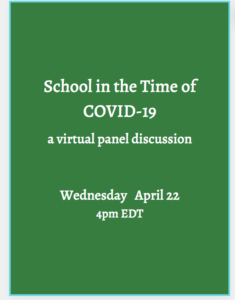 Thanks to all who attended the Ground Control Parenting/Hunter College Continuing Education webinar School in the Time of COVID-19, which was held on April 22. We had a great turnout, and heard wonderful advice and tips from our panel of experts:
Thanks to all who attended the Ground Control Parenting/Hunter College Continuing Education webinar School in the Time of COVID-19, which was held on April 22. We had a great turnout, and heard wonderful advice and tips from our panel of experts:
- Dr. Karen Hopkins, Associate Professor of Pediatrics at NYU Grossman School of Medicine, specializing in behavioral and developmental pediatrics
- Tali Horowitz, NYC Education Director, Common Sense Media
- Robert Taylor, Social Science High School Teacher and Varsity Track Head Coach, Brunswick School, CT
- Jennifer Vermont-Davis, Lower School Science Teacher, The Allen-Stevenson School, NYC
I moderated the hour-long discussion and incorporated into it many of the great questions parents sent in advance. Here are some of the highlights:
Managing Our Children’s Anxiety: Dr. Hopkins noted that children are so anxious in great part because parents are so anxious. She explained that parents must first acknowledge that they have to manage their own anxiety. How to manage it? “Turn off a 24 hour news cycle. Find a trusted news source that you can understand and that you can get good information from, and go with those recommendations.” She also advised parents to regularly schedule activities which make them less anxious (e.g., exercise, an escapist tv show or book). An important tip for reducing family anxiety: make sure everyone has structure and expectations for each day. “Wake up every morning with a plan” she suggested .
How Should We Talk to Our Kids About This Virus?: Dr. Hopkins explained that toddlers and younger children don’t really understand what is going on, and are primarily pleased to have their parents around all the time, so a lot of explanation of the impact of the pandemic isn’t necessary. But when dealing with middle and high school students who miss their friends and are upset about all they are missing (in school and socially), compassionate conversation can help. Dr. Hopkins suggested that parents assure their older children that their concerns are legitimate, and sympathetically agree that it is terrible and unfair that they can’t do all the things they had been looking forward to. Don’t try to dismiss or minimize their frustration. It is real, and they need to be able to express it.
Academic Expectations: Classroom educators Jennifer Vermont-Davis and Robert Taylor agreed that neither teachers nor students prefer this remote learning experience to being in class. They noted that schools had to lower their expectations of what students would be able to learn this semester, and advised that parents do the same. Some children will adhere to a daily schedule of schoolwork, and others will not want to do the work. Schools understand that these are extraordinary times and that many students find home schooling/remote learning extremely stressful. In response schools are adopting a wide range of policies to ease the stress which have included making classes pass fail, shortening the class day, reducing the amount of homework and testing. While this will impact the speed with which children in lower grades can advance, since all children are being severely impacted, schools will be dealing with how to remedy this for all when they return to the classroom.
Parents should stress less about individual assignments and should focus more on children’s well being and their ability to be engaged in some kind of intellectual pursuit, something that encourages critical thinking. For the younger set, if they are having trouble focusing online, give them projects to do around the house, like alphabetizing and organizing books, or finding items in a scavenger hunt you create for them. Encourage your older reluctant students to dive into one of their interests, even if it isn’t one they are studying in school. Make sure your children are getting exercise. Having older and younger children help with meal preparation means they are using math, science (talk about the chemical reactions of mixing ingredients) and reading (encourage the younger ones to read the recipes aloud to the cooks).
Want to watch the entire webinar? You can do so here.
Stay tuned for Part II of the webinar highlights, which will include helpful advice on managing screen time, on line learning resources and ideas, and silver linings in this COVID-19 cloud.





